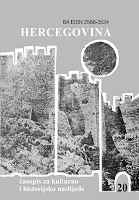BRANKO MIKULIĆ O AKTIVNOSTI I METODAMA RADA SAVEZA KOMUNISTA I NACIONALNOM PITANJU U HERCEGOVINI NAKON 21. SJEDNICE PREDSJEDNIŠTVA SKJ
BRANKO MIKULIC ON ACTIVITY AND WORK METHODS OF THE LEAGUE OF COMMUNISTS AND NATIONAL ISSUE IN HERZEGOVINA AFTER THE 21ST SESSION OF THE PRESIDENCY OF THE LCY
Author(s): Dženita Sarač-RujanacSubject(s): Political history, Social history, Post-War period (1950 - 1989), History of Communism, Sociology of Politics
Published by: Fakultet humanističkih nauka, Univerzitet »Džemal Bijedić« u Mostaru
Keywords: Yugoslav society; socialism; communism; Branko Mikulić;
Summary/Abstract: The national issue was crucial in the context of the transformation of Yugoslav society from socialism to the desired communism. However, in federal Yugoslavia, this issue was proved highly dynamic, and it was resuscitated anew and interpreted significantly differently. Republic leadership in the Socialist Republic of Bosnia and Herzegovina forced the proclaimed principle of national equality, the dogma of brotherhood and unity; in addition, it was highly sensitive to any stepping out of the defined frame. It also listened carefully to impulses coming from other republics, following the events, especially in the Socialist Republic of Croatia and the Socialist Republic of Serbia, which could have affected the mood and activity of the population within the borders of Bosnia and Herzegovina. Based on the original archives, this paper focuses on the President of the Central Committee of the League of Communists of Bosnia and Herzegovina Branko Mikulic during the early 1970s, a period of significant political turbulence throughout Yugoslavia. We indicated what he spoke about the position and activities of the League of Communists, the adopted national policy, the conclusions of the 21st session of the Presidency of the LCY and their implementation in Western Herzegovina. Mikulic has been visiting this part of the Republic intending to encourage the activities of the League of Communists, on the trail of the conclusions of the Mostar Consultation (1966), and remove the mortgage of ustashism from the position of Western Herzegovina, unfounded insistence on collective responsibility and generalization. He insisted that the local staff under the aegis of the Central Committee of the League of Communists of Bosnia and Herzegovina should solve problems in this part of the Republic, as well that interference from the Socialist Republic of Croatia and the Socialist Republic of Serbia makes the position of the people in Bosnia and Herzegovina onerous. Ultimately, even though the 1970s was a decade of significant progress, the economic development of Herzegovina did not go according to plan and republic funds should have supported local loans and self-contributions to a greater extent. Life in Western Herzegovina has differed significantly from the model defined in party documents, numerous conclusions and resolutions. In congruence with the crucial transforming processes of Yugoslav federalism, there was no intention to change certain practices and attitudes of the Party. However, the national question, and thus the national affirmation, was under the firm supervision of the leadership, which was in constant fear of crossing the permitted border and disturbing the strict balance of nations of Bosnia and Herzegovina in conformity with its views and determinants.
Journal: Hercegovina
- Issue Year: 2021
- Issue No: 20
- Page Range: 73-105
- Page Count: 33
- Language: Bosnian
- Content File-PDF

